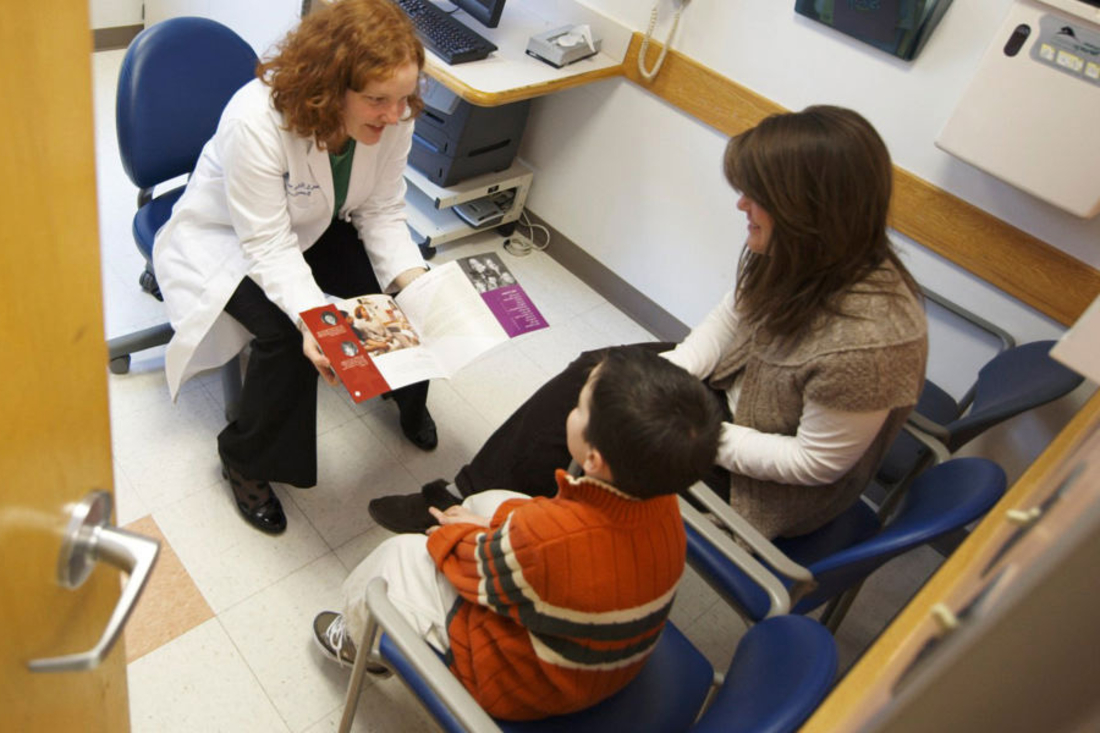Anal Atresia, Imperforate Anus and Other Anorectal Malformations
Edward Doolin, MD: When we treat anorectal malformations, we've passed being satisfied with survival. The ability to correct these functions, the ability to restore a child's life style and self-worth, is invigorating. And the team and community that comes together to do this, it’s a very close relationship, and it's one that endures.
PACE treats anorectal and pelvic malformations. These are simply diseases where the rectum and anus did not form. And that can range from anything as minor as the anal opening being in the wrong location or as severe as the colon stopping within the abdomen and having no connection to the bottom and everything in between.
Karen Barnaby, RN, MSN, CRNP: An anorectal malformation is a lifelong condition that is managed by our clinic over months and sometimes years.
Gina Kroeplin, MS, CRNP: Shortly after the child's born, it may be very obvious that they have imperforate anus because they may not have an opening at all.
Melissa: initially when the nurses went to take my temperature rectally, there was no rectum to put the thermometer in. But a couple hours after I was born, Dr. Doolin did scopes to find out what was wrong. I was diagnosed with anal atresia, which is also known as imperforate anus.
Gina Kroeplin, MS, CRNP: So if there's no opening at all, then you'll see that the child cannot pass stool and they develop abdominal distension, and that is an emergency where you do need to do diverting colostomy.
Edward Doolin, MD: With anorectal abnormalities, except for the very simplest form, the first treatment is to bypass the obstruction with a colostomy.
Melissa: And Dr. Doolin, when I was 2 days old, did a procedure where he gave me a colostomy bag.
Karen Barnaby, RN, MSN, CRNP: A colostomy is where you bring a portion of the intestine up to the abdominal wall and make an opening through which the stool leaves the body into a bag.
Gina Kroeplin, MS, CRNP: And then we let them grow and we watch their growth very, very carefully to make sure that they're thriving, they're eating well, they're not getting a swollen belly, and that the colostomy is able to produce the bowel movements. And somewhere in the vicinity of about three months or so then they're able to go to the next stage of the surgery, which is the pull-through procedure.
Edward Doolin, MD: Children with anorectal malformations and pelvic malformations will not have a normal bowel movement. These children require reconstruction which is one of the main services of the program. The definitive treatment using a pull-through procedure is by far the approach of choice.
Gina Kroeplin, MS, CRNP: They need to align the bowel and create a rectum if it hasn't formed.
Edward Doolin, MD: An anal atresia, the GI tract stops short of the bottom. As such, it has to be brought into place. The rectum is mobilized from its attachment to either the bladder or vagina and brought to the skin to create a new anus.
Melissa: Dr. Doolin really pushed my mom and dad for me to have this procedure even when they weren't sure. He told her, you have to give her a chance in life. And it has really allowed me to live my life as normal as possible. I don't think of myself as abnormal in that area because I was able to have the pull-through procedure.
Karen Barnaby, RN, MSN, CRNP: The surgery is only the beginning of a very long journey, and I'm glad that we have a program that's willing to spend the time with these families that it takes. This is a lifelong commitment that they need to make to both our clinic and their children.
Edward Doolin, MD: Children with anorectal malformations are put on a fairly rigid regimen. We start this young to help condition their organs. If they don't get managed young, their colons will slowly dilate over the time and become unresponsive to any management that we try.
Karen Barnaby, RN, MSN, CRNP: We work with the families and use a number of therapies that assist the patient in being able to move poop to the outside of their body. In the PACE program, we find ourselves involving many specialists. We use nutritionists, we use gastroenterologists, we involve psychologists, we involve neurosurgeons, we involve social workers, and often many other specialties that are just individually necessary to that child's care.
Gina Kroeplin, MS, CRNP: Frequently these children will be on, at the very least, fiber and a gentle laxative during their lifetime, and that's just to keep things moving the way that it needs to so that stool doesn't slow down and things don't overstretch. And so the follow-up is key. They need to see us very frequently in the beginning, and then as time is established and we get them on a good program, and then we can touch base with them one to two times a year and then as needed.
Melissa: I was able to go to college and I graduated with honors. And now I'm working, teaching kindergarten, my dream job. Because of following through and taking care of myself, I've been able to live a normal life. As a kid I did everything that kids do; I played T-ball, I rode bikes, scooters, played catch with my friends outside. Now that I'm older, I drive all around. I go … I work, I go out with my friends after for dinner, things like that, you know.
Edward Doolin, MD: Melissa is a metaphor for this entire approach to healthcare. I treated Melissa since she was a brand new baby. I think Melissa demonstrates the inspiration that the patients feel when they deal with it successfully.
Melissa: It's a part of who I am and I don't have to be embarrassed about it. I would tell any child who's going through this just to stick with it. And even though it might seem difficult now, this procedure will help you to live a normal life. You don't have to let your problems slow you down.






